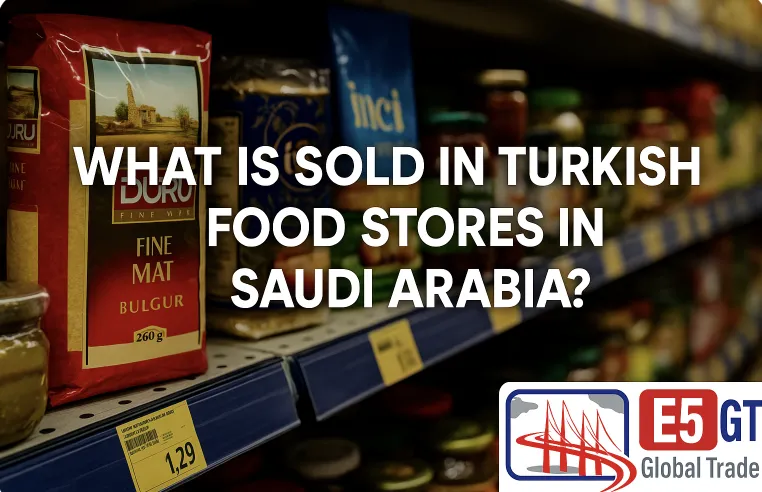What's Sold in Turkish Food Stores in Saudi Arabia? Interest in Turkish food products has increased exponentially in Saudi Arabia in recent years. This demand extends not only to individual consumers but also to retailers, distributors, and even government-sponsored projects. Within this framework, Turkish food stores in Saudi Arabia are opening in increasing numbers, becoming not just a shopping destination but also a cultural bridge. The products sold here stand out not only for their taste but also for their origin story, packaging quality, and brand value. These stores are concentrated in major cities such as Riyadh, Jeddah, and Dammam, and primarily serve the middle and upper-income segments. Among the most popular categories sold in these stores are olive oil, olives, cheese, jam, honey, molasses, nuts, spices, ready-to-break-the-fast food sets, and Turkish coffee. Demand for these products increases exponentially, especially during Ramadan. Stores create special gift boxes for this period and target consumers with luxurious packaging. Olive oil bottles are generally made of dark glass, providing UV protection. Labels always include Arabic information, including product origin, product composition, and instructions. In the cheese aisles, products like feta cheese, tulum cheese, kashar cheese, and string cheese are highly sought after. Turkish white cheese, in particular, has become a staple on breakfast tables in Saudi Arabia. These products are usually packaged in small blocks and transported in a refrigerated warehouse. Mixed spice sets are in high demand in the jam and honey aisles. For example, a box containing plum jam, fig jam, apricot jam, and natural honey is offered together. These sets are favored by both consumers and gift buyers. In the dried fruit and nut aisles, pistachios, almonds, walnuts, raisins, and dates are in high demand. Mixed spice boxes, often offered with dates, are particularly popular during iftar. Spice aisles feature products like chili pepper flakes, cumin, thyme, mint, and isot. These spices are usually sold in small bags and are favored by homemakers. Some stores also offer custom-mixed spices. Ready-made iftar sets are particularly popular during Ramadan. These sets include products such as olive oil, cheese, jam, honey, dried fruits, olives, sausage, pastrami, and Turkish coffee. The packaging includes a luxuriously designed ribbon, note card, and even a small thank-you message. These details boost brand loyalty. Turkish coffee, however, is a separate category. Coffee sets, especially those offered with traditional water ewers, are particularly popular. The coffee packages include an Arabic user manual and brewing instructions. Some stores also organize coffee workshops to educate consumers. Most of these stores import directly from Turkey, but some have a local warehouse and distribute from there. These warehouses are equipped with cold storage and humidity control to maintain product quality. E5 Global Trade ensures that producers are matched with the right store chain during this process, manages contract processes, and ensures payment security. Social media plays a significant role in marketing. In-store tours, product demonstrations, and customer reviews are shared on Instagram and TikTok. Videos showing the products used on a Turkish family's iftar table are particularly popular. E5 Global Trade supports the visibility of producers' brands on these platforms during this process. Ultimately, the products sold in Turkish food stores in Saudi Arabia are not just food but also a cultural expression. Success is achieved through quality presentation and the right distribution channels. E5 Global Trade is a partner who demonstrates that producers are not alone in this journey. Because true trade is much more than just shipping products.
E5 Global Trade | Yazılar
What's Sold in Turkish Food Stores in Saudi Arabia?
Küresel Haber Ajansı
·


